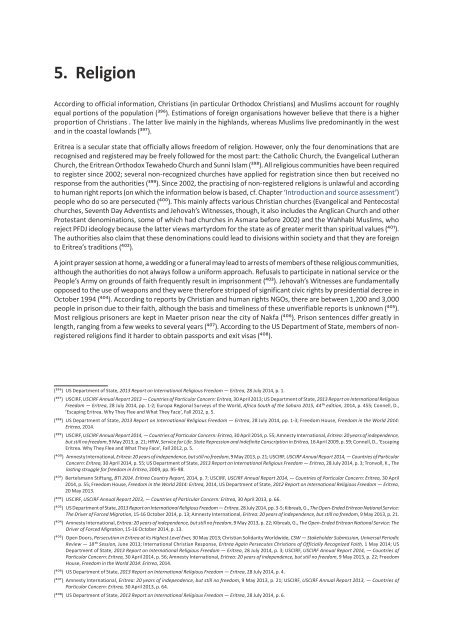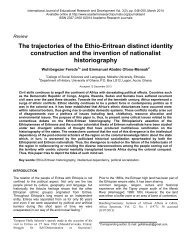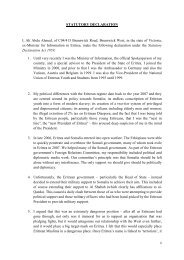You also want an ePaper? Increase the reach of your titles
YUMPU automatically turns print PDFs into web optimized ePapers that Google loves.
5. Religion<br />
According to official information, Christians (in particular Orthodox Christians) and Muslims account for roughly<br />
equal portions of the population (396). Estimations of foreign organisations however believe that there is a higher<br />
proportion of Christians . The latter live mainly in the highlands, whereas Muslims live predominantly in the west<br />
and in the coastal lowlands (397).<br />
<strong>Eritrea</strong> is a secular state that officially allows freedom of religion. However, only the four denominations that are<br />
recognised and registered may be freely followed for the most part: the Catholic Church, the Evangelical Lutheran<br />
Church, the <strong>Eritrea</strong>n Orthodox Tewahedo Church and Sunni Islam (398). All religious communities have been required<br />
to register since 2002; several non-recognized churches have applied for registration since then but received no<br />
response from the authorities (399). Since 2002, the practising of non-registered religions is unlawful and according<br />
to human right reports (on which the information below is based, cf. Chapter ‘Introduction and source assessment’)<br />
people who do so are persecuted (400). This mainly affects various Christian churches (Evangelical and Pentecostal<br />
churches, Seventh Day Adventists and Jehovah’s Witnesses, though, it also includes the Anglican Church and other<br />
Protestant denominations, some of which had churches in Asmara before 2002) and the Wahhabi Muslims, who<br />
reject PFDJ ideology because the latter views martyrdom for the state as of greater merit than spiritual values (401).<br />
The authorities also claim that these denominations could lead to divisions within society and that they are foreign<br />
to <strong>Eritrea</strong>’s traditions (402).<br />
A joint prayer session at home, a wedding or a funeral may lead to arrests of members of these religious communities,<br />
although the authorities do not always follow a uniform approach. Refusals to participate in national service or the<br />
People’s Army on grounds of faith frequently result in imprisonment (403). Jehovah’s Witnesses are fundamentally<br />
opposed to the use of weapons and they were therefore stripped of significant civic rights by presidential decree in<br />
October 1994 (404). According to reports by Christian and human rights NGOs, there are between 1,200 and 3,000<br />
people in prison due to their faith, although the basis and timeliness of these unverifiable reports is unknown (405).<br />
Most religious prisoners are kept in Maeter prison near the city of Nakfa (406). Prison sentences differ greatly in<br />
length, ranging from a few weeks to several years (407). According to the US Department of State, members of nonregistered<br />
religions find it harder to obtain passports and exit visas (408).<br />
(396) US Department of State, 2013 <strong>Report</strong> on International Religious Freedom — <strong>Eritrea</strong>, 28 July 2014, p. 1.<br />
(397) USCIRF, USCIRF Annual <strong>Report</strong> 2013 — Countries of Particular Concern: <strong>Eritrea</strong>, 30 April 2013; US Department of State, 2013 <strong>Report</strong> on International Religious<br />
Freedom — <strong>Eritrea</strong>, 28 July 2014, pp. 1-2; Europa Regional Surveys of the World, Africa South of the Sahara 2015, 44th edition, 2014, p. 455; Connell, D.,<br />
‘Escaping <strong>Eritrea</strong>. Why They Flee and What They Face’, Fall 2012, p. 5.<br />
(398) US Department of State, 2013 <strong>Report</strong> on International Religious Freedom — <strong>Eritrea</strong>, 28 July 2014, pp. 1-3; Freedom House, Freedom in the World 2014:<br />
<strong>Eritrea</strong>, 2014.<br />
(399) USCIRF, USCIRF Annual <strong>Report</strong> 2014, — Countries of Particular Concern: <strong>Eritrea</strong>, 30 April 2014, p. 55; Amnesty International, <strong>Eritrea</strong>: 20 years of independence,<br />
but still no freedom, 9 May 2013, p. 21; HRW, Service for Life. State Repression and Indefinite Conscription in <strong>Eritrea</strong>, 16 April 2009, p. 59; Connell, D., ‘Escaping<br />
<strong>Eritrea</strong>. Why They Flee and What They Face’, Fall 2012, p. 5.<br />
(400) Amnesty International, <strong>Eritrea</strong>: 20 years of independence, but still no freedom, 9 May 2013, p. 21; USCIRF, USCIRF Annual <strong>Report</strong> 2014, — Countries of Particular<br />
Concern: <strong>Eritrea</strong>, 30 April 2014, p. 55; US Department of State, 2013 <strong>Report</strong> on International Religious Freedom — <strong>Eritrea</strong>, 28 July 2014, p. 3; Tronvoll, K., The<br />
lasting struggle for freedom in <strong>Eritrea</strong>, 2009, pp. 95-98.<br />
(401) Bertelsmann Stiftung, BTI 2014. <strong>Eritrea</strong> Country <strong>Report</strong>, 2014, p. 7; USCIRF, USCIRF Annual <strong>Report</strong> 2014, — Countries of Particular Concern: <strong>Eritrea</strong>, 30 April<br />
2014, p. 55; Freedom House, Freedom in the World 2014: <strong>Eritrea</strong>, 2014, US Department of State, 2012 <strong>Report</strong> on International Religious Freedom — <strong>Eritrea</strong>,<br />
20 May 2013.<br />
(402) USCIRF, USCIRF Annual <strong>Report</strong> 2013, — Countries of Particular Concern: <strong>Eritrea</strong>, 30 April 2013, p. 66.<br />
(403) US Department of State, 2013 <strong>Report</strong> on International Religious Freedom — <strong>Eritrea</strong>, 28 July 2014, pp. 3-5; Kibreab, G., The Open-Ended <strong>Eritrea</strong>n National Service:<br />
The Driver of Forced Migration, 15-16 October 2014, p. 13; Amnesty International, <strong>Eritrea</strong>: 20 years of independence, but still no freedom, 9 May 2013, p. 21.<br />
(404) Amnesty International, <strong>Eritrea</strong>: 20 years of independence, but still no freedom, 9 May 2013, p. 22; Kibreab, G., The Open-Ended <strong>Eritrea</strong>n National Service: The<br />
Driver of Forced Migration, 15-16 October 2014, p. 13.<br />
(405) Open Doors, Persecution in <strong>Eritrea</strong> at its Highest Level Ever, 30 May 2013; Christian Solidarity Worldwide, CSW — Stakeholder Submission, Universal Periodic<br />
Review — 18th Session, June 2013; International Christian Response, <strong>Eritrea</strong> Again Persecutes Christians of Officially Recognized Faith, 1 May 2014; US<br />
Department of State, 2013 <strong>Report</strong> on International Religious Freedom — <strong>Eritrea</strong>, 28 July 2014, p. 3; USCIRF, USCIRF Annual <strong>Report</strong> 2014, — Countries of<br />
Particular Concern: <strong>Eritrea</strong>, 30 April 2014, p. 56; Amnesty International, <strong>Eritrea</strong>: 20 years of independence, but still no freedom, 9 May 2013, p. 22; Freedom<br />
House, Freedom in the World 2014: <strong>Eritrea</strong>, 2014.<br />
(406) US Department of State, 2013 <strong>Report</strong> on International Religious Freedom — <strong>Eritrea</strong>, 28 July 2014, p. 4.<br />
(407) Amnesty International, <strong>Eritrea</strong>: 20 years of independence, but still no freedom, 9 May 2013, p. 21; USCIRF, USCIRF Annual <strong>Report</strong> 2013, — Countries of<br />
Particular Concern: <strong>Eritrea</strong>, 30 April 2013, p. 64.<br />
(408) US Department of State, 2013 <strong>Report</strong> on International Religious Freedom — <strong>Eritrea</strong>, 28 July 2014, p. 6.






